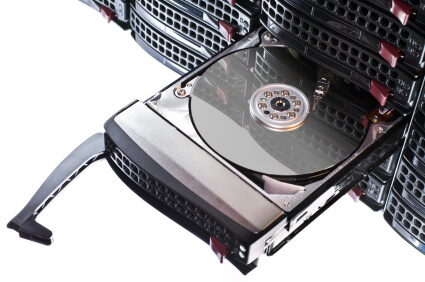TRUSTED EXPERTS
ANY DEVICE
What’s the Difference between an NAS Appliance and a RAID Server?

There are many options available for home, small business and enterprise level storage. As many large organizations make the shift to virtualization for efficiency and increased storage capacity, simpler options exist using the principles of RAID storage. Let’s explore two common storage devices and how they differ.
What Is RAID?
To go back to storage technology 101, RAID is a Redundant Array of Inexpensive (or Independent, depending on who you talk to) Disks. Depending on the RAID level and RAID configuration, the device uses two or more disks and either duplicates data across drives for increased stability and protection or stripes data across drives for increased performance.
RAID 5 servers and higher provide a blend of increased performance and duplication for added security. RAID servers frequently employ a controller to manage the data across three or more hard disk drives.
24 Hour Data has stayed on top of RAID technology advancements and maintains high success rates for RAID data recovery. You can read more about our RAID recovery techniques here.
What Is An NAS Appliance?
NAS stands for Network Attached Storage, which means that the storage device is attached to your computer over the local area network (usually via Ethernet) and stores data without adding software applications to your computer workstation or taking up storage space or memory on your computer. In this way, NAS differs from Direct Attached Storage.
Like a RAID server, NAS uses a RAID configuration for redundancy and increased speed. However, because a RAID server is connected directly to the computer, it will naturally be faster than a NAS device. Latency in the network connection won’t affect a direct attached RAID array. A RAID server, although it is an external device, operates much like an internal hard drive.
A NAS device would be preferred if multiple workstations had to connect to the same data and applications. Rather than using separate RAID arrays, resulting in additional software and hardware costs, a NAS device permits network connection to any workstation without using the resources of the computer it is attached to.
RAID or NAS?
Whether you choose Network Attached Storage or a Direct Attached (DAS) RAID array, note that performance and storage capacity and features vary widely between different models. Consider the level and configuration of the RAID, the controller, and the storage capacity before making your choice.
Whatever you choose, 24 Hour Data’s recovery specialists have expertise in NAS recovery and RAID recovery for all popular makes and models, including IBM, Cisco, Dell, HP and many others.
Start A Recovery
Get Started Below
Error: Contact form not found.
![]() WOW... fantastic customer experience! Submitted a totally dead 1TB drive for recovery yesterday now its fully recovered before noon the next day! Exceptional customer service, and impeccable reputation. Thank you 24 Hour Data, ever so much for getting my valuable data recovered and back to me. Very reasonable rates. My hat goes off to the BEST data recovery service in Dallas or in the country for that matter! You will not be disappointed using their services....
WOW... fantastic customer experience! Submitted a totally dead 1TB drive for recovery yesterday now its fully recovered before noon the next day! Exceptional customer service, and impeccable reputation. Thank you 24 Hour Data, ever so much for getting my valuable data recovered and back to me. Very reasonable rates. My hat goes off to the BEST data recovery service in Dallas or in the country for that matter! You will not be disappointed using their services....
Mark Davis
Bear Technologies











